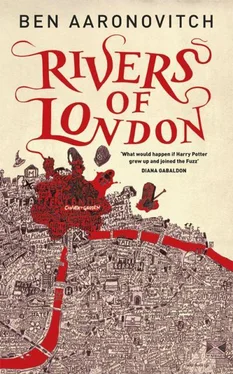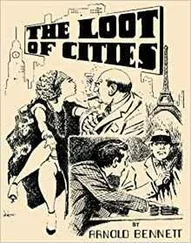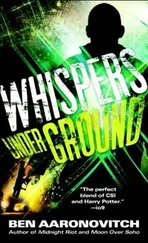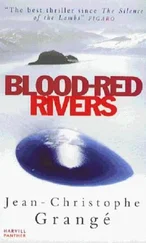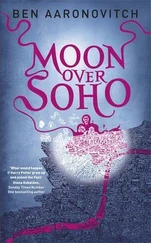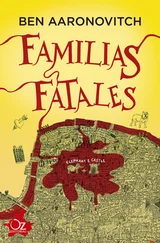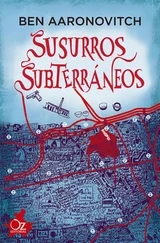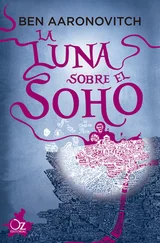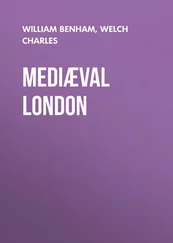I said not at all, and he returned to spearing food out of his bent with quick jabs of his chopsticks.
‘Did he come back?’ asked Nightingale.
‘Who?’
‘Your ghost,’ said Nightingale. ‘Nicholas Wallpenny: lurker, bug hunter and sneak thief. Late of the parish of St Giles. Can you hazard a guess as to where he’s buried?’
‘In the cemetery of the Actors’ Church?’
‘Very good,’ Nightingale said, and grabbed a duck wrap with a quick stab of his chopsticks. ‘So, did he come back?’
‘No he didn’t,’ I said.
‘Ghosts are capricious,’ he said. ‘They really don’t make reliable witnesses.’
‘Are you telling me ghosts are real?’
Nightingale carefully wiped his lips with a napkin.
‘You’ve spoken to one,’ he said. ‘What do you think?’
‘I’m awaiting confirmation from a senior officer,’ I said.
He put the napkin down and picked up his teacup. ‘Ghosts are real,’ he took a sip.
I stared at him. I didn’t believe in ghosts, or fairies or gods, and for the last couple of days I’d been like a man watching a magic show — I’d expected a magician to step out from behind the curtain and ask me to pick a card, any card. I wasn’t ready to believe in ghosts, but that’s the thing about empirical experience — it’s the real thing.
And if ghosts were real?
‘Is this where you tell me that there’s a secret branch of the Met whose task it is to tackle ghosts, ghouls, faeries, demons, witches and warlocks, elves and goblins … ?’ I said. ‘You can stop me before I run out of supernatural creatures.’
‘You haven’t even scratched the surface,’ said Nightingale.
‘Aliens?’ I had to ask.
‘Not yet.’
‘And the secret branch of the Met?’
‘Just me, I’m afraid,’ he said.
‘And you want me to what … join?’
‘Help,’ said Nightingale, ‘with this inquiry.’
‘You think there’s something supernatural about the murder?’ I asked.
‘Why don’t you tell me what your witness had to say,’ he said, ‘and then we’ll see where it goes.’
So I told him about Nicholas and the change of clothes by the murdering gent. About the CCTV coverage and the Murder Team thinking it was two separate people. When I’d finished, he signalled the waitress for the bill.
‘I wish I’d known this yesterday,’ he said. ‘But we still might be able to pick up a trace.’
‘A trace of what, sir?’ I asked.
‘The uncanny,’ said Nightingale. ‘It always leaves a trace.’
Nightingale’s motor was a Jag, a genuine Mark 2 with the 3.8 litre XK6 engine. My dad would have sold his trumpet for a chance to own a car like that, and that was back in the 1960s when that still meant something. It wasn’t pristine: there were some dings on the body work and a nasty scratch on the driver’s side door, and the leather on the seats was beginning to crack, but when Nightingale turned the key in the ignition and the inline-6 rumbled, it was perfect where it counted.
‘You took sciences at A level,’ said Nightingale as we pulled out. ‘Why didn’t you take a science degree?’
‘I got distracted, sir,’ I said. ‘My grades were low and I couldn’t get on the course that I wanted.’
‘Really? What was the distraction?’ he asked. ‘Music, perhaps? Did you start a band?’
‘No sir,’ I said. ‘Nothing that interesting.’
We headed down through Trafalgar Square and took advantage of the discreet Metropolitan Police flash on the windscreen to cut through the Mall, past Bucking-ham Palace and into Victoria. I knew there were only two places we might be going; Belgravia nick, where the Murder Team had their incident room, or Westminster Mortuary where the body was stashed. I hoped it was the incident room, but of course it was the mortuary.
‘But you understand the scientific method, though?’ asked Nightingale.
‘Yes sir,’ I said, and thought, Bacon, Descartes and Newton — check. Observation, hypothesis, experiment and something else that I could look up when I got back to my laptop.
‘Good,’ said Nightingale. ‘Because I need someone with some objectivity.’
Definitely the morgue then, I thought.
Its official name is the Iain West Forensic Suite, and it represents the Home Office’s best attempt to make one of its mortuaries look as cool as the ones in American TV shows. In order to keep filthy policemen from contaminating any trace evidence on the body, there was a special viewing area with live autopsies piped in by closed-circuit television. This had the effect of reducing even the most grisly post-mortem to nothing more than a gruesome TV documentary. I was all for that but Nightingale, on the other hand, said that we needed to get close to the corpse.
‘Why?’ I asked.
‘Because there are other senses than sight,’ said Nightingale.
‘Are we talking ESP here?’
‘Just keep an open mind,’ said Nightingale.
The staff made us don clean suits and masks before letting us near the slab. We weren’t relatives, so they didn’t bother with a discreet cloth to cover the gap between the body’s shoulders and the head. I was so glad I’d skipped the bent that morning.
I guessed William Skirmish had been an unremarkable man when he was alive. Middle-aged, just over average height, his muscle tone was flabby but he wasn’t fat. I found it surprisingly easy to look at the detached head, with its ragged edge of torn skin and muscle instead of a neck. People assume that, as a police officer, your first dead person will be a murder victim, but the truth is it’s usually the result of a car accident. My first had been on day two, when a cycle courier had had his head knocked off by a transit van. After that you don’t exactly get used to it but you do know that it could be a lot worse. I wasn’t exactly enjoying the headless Mr Skirmish, but I had to admit it was less intimidating than I’d imagined it.
Nightingale bent over the body and practically stuck his face into the severed neck. He shook his head and turned to me. ‘Help me turn him over,’ he said.
I didn’t want to touch the body, not even with surgical gloves on, but I couldn’t bottle out now. The body was heavier than I was expecting, cold and inert as it flopped onto its belly. I quickly stepped away but Nightingale beckoned me over.
‘I want you to get your face as close to his neck as possible, close your eyes and tell me what you feel,’ said Nightingale.
I hesitated.
‘I promise it will become clear,’ he said.
The mask and eye protectors helped; there was no chance of me accidentally kissing the dead guy. I did as I was told and closed my eyes. At first there was just the smell of disinfectant, stainless steel and freshly washed skin, but after a few moments I became aware of something else, a scratchy, wiry, panting, wet-nose, wagging sensation.
‘Well?’ asked Nightingale.
‘A dog,’ I said. ‘A little yappy dog.’
Growling, barking, yelling, flashes of cobbles, sticks, laughing — maniacal, high-pitched laughing.
I stood up sharply.
‘Violence and laughter?’ asked Nightingale. I nodded.
‘What was that?’ I asked.
‘The uncanny,’ said Nightingale. ‘It’s like a bright light when you close your eyes, it leaves an afterimage. We call it vestigium .’
‘How do I know I didn’t just imagine it?’ I asked.
‘Experience,’ said Nightingale. ‘You learn to distinguish the difference through experience.’
Thankfully we turned our back on the body and left.
‘I barely felt anything,’ I said, while we were changing. ‘Is it always that weak?’
‘That body’s been on ice for two days,’ said Nightingale, ‘and dead bodies don’t retain vestigia very well.’
Читать дальше
